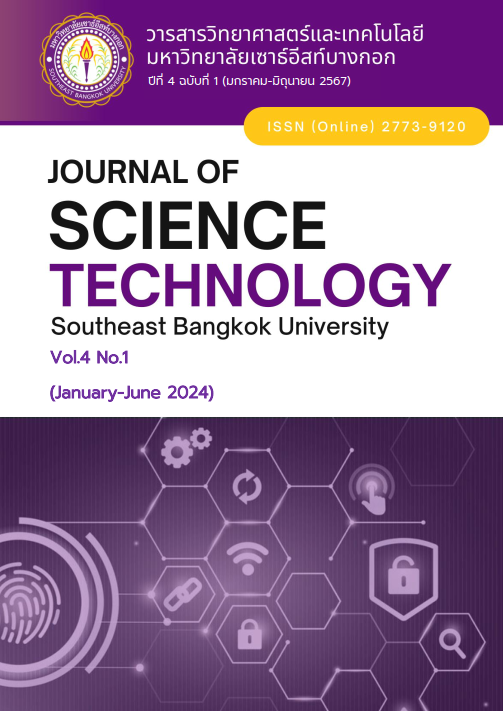การพัฒนาบอร์ดเกมการเรียนรู้ตามแนวทางทฤษฎีพัฒนาการทางความคิดของเพียเจท์เพื่อส่งเสริมทักษะการยืดหยุ่นทางความคิดของนักศึกษาในศตวรรษที่ 21 บทความวิจัย
Main Article Content
บทคัดย่อ
การวิจัยครั้งนี้มีวัตถุประสงค์เพื่อ 1) พัฒนาบอร์ดเกมการเรียนรู้ เพื่อส่งเสริมทักษะการยืดหยุ่นทางความคิดของนักศึกษาในศตวรรษที่ 21 2) เปรียบเทียบผลสัมฤทธิ์ก่อนและหลังทดสอบบอร์ดเกมการเรียนรู้ เพื่อส่งเสริมทักษะการยืดหยุ่นทางความคิดของนักศึกษาในศตวรรษที่ 21 กลุ่มตัวอย่าง ได้แก่ นักศึกษาระดับปริญญาตรี มหาวิทยาลัยเซาธ์อีสท์บางกอก
ในประจำปีการศึกษา 2566 ภาคเรียนที่ 2 เรียนในรายวิชาการเขียนโปรแกรมเกมคอมพิวเตอร์ 2 จำนวน 19 คน โดยการเลือกกลุ่มตัวอย่างแบบเจาะจง (Purposive Sampling) เครื่องมือที่ใช้ในการวิจัย ได้แก่ 1) บอร์ดเกมการเรียนรู้ตามแนวทางทฤษฎีพัฒนาการทางความคิดของเพียเจท์เพื่อส่งเสริมทักษะการยืดหยุ่นทางความคิดของนักศึกษาในศตวรรษที่ 21 และ
2) แบบทดสอบผลสัมฤทธิ์ทางการเรียนบอร์ดเกมฯ สถิติที่ใช้ในการวิจัย ได้แก่ ร้อยละ ค่าเฉลี่ย ส่วนเบี่ยงเบนมาตรฐาน และเปรียบเทียบค่าสถิติ (Dependent t-test) ผลการวิจัยพบว่า 1) ผลการพัฒนาบอร์ดเกมการเรียนรู้ เพื่อส่งเสริมทักษะ
การยืดหยุ่นทางความคิดของนักศึกษาในศตวรรษที่ 21 มีองค์ประกอบ ได้แก่ 1) กำหนดเนื้อหาหรือเนื้อเรื่อง 2) การกำหนดจุดประสงค์ 3) การเลือกใช้กลไก 4) กฎ กติกา 5) ระยะเวลาในการเล่น 6) การสะท้อนกลับ และ 7) การออกแบบกราฟิก
ในเกม 2) ผลสัมฤทธิ์ก่อนและหลังทดสอบบอร์ดเกมการเรียนรู้ เพื่อส่งเสริมทักษะการยืดหยุ่นทางความคิดของกลุ่มตัวอย่าง พบว่า คะแนนหลังทดสอบอยู่ในระดับมาก ( =3.71, S.D.=0.82) มีคะแนนมากกว่าก่อนทดสอบซึ่งอยู่ในระดับปานกลาง ( =3.01, S.D.=0.04) โดยประกอบไปด้วย 3 องค์ประกอบ คือ 1) องค์ประกอบ ทางเลือก คะแนนหลังทดสอบอยู่ใน
ระดับมาก ( =3.54, S.D.=0.84) มีคะแนนมากกว่าก่อนทดสอบอยู่ในระดับปานกลาง ( =3.12, S.D.=0.68) 2) องค์ประกอบ
การควบคุม คะแนนหลังทดสอบอยู่ในระดับมาก ( =3.54, S.D.=0.84) มีคะแนนมากกว่าก่อนทดสอบอยู่ในระดับปานกลาง ( =3.00, S.D.=0.61) 3) องค์ประกอบ การรับรู้ประสิทธิภาพของตนเอง คะแนนหลังทดสอบอยู่ในระดับมาก
( =3.74, S.D.=0.72) มีคะแนนมากกว่าก่อนทดสอบอยู่ในระดับปานกลาง ( =2.92, S.D.=0.59) สรุปได้ว่า คะแนนทักษะการยืดหยุ่นทางความคิด หลังทดสอบด้วยบอร์ดเกมตามแนวทางทฤษฎีฯ สูงกว่าก่อนเรียน ที่ระดับนัยสำคัญ .05
โดยก่อนทดสอบ มีค่าเฉลี่ยเท่ากับ 3.01 และส่วนเบี่ยงเบนมาตรฐาน 0.04 หลังทดสอบ มีค่าเฉลี่ยเท่ากับ 3.71 และ
ค่าส่วนเบี่ยงเบนมาตรฐาน 0.82 โดยมีค่า t test เท่ากับ 1.734
Article Details

อนุญาตภายใต้เงื่อนไข Creative Commons Attribution-NonCommercial-NoDerivatives 4.0 International License.
บทความที่ได้รับการตีพิมพ์และเป็นลิขสิทธิ์ของวารสารวิทยาศาสตร์และเทคโนโลยี มหาวิทยาลัยเซาธ์อีสท์บางกอก
เอกสารอ้างอิง
S. Tantiboonyanont, "Learning Management to Enhance Resilience Competency on Cloud Technology Based on Disc Model in Crisis," Journal of Educational Review Faculty of Education in MCU, vol. 8,no. 1, pp. 361-374, 2021.
P. Sritakaew and C. Cheausuwantavee, "Effects of the learning cell based on gamification concept toward mathematical achievement and problem posing ability for Matthayomsuksa five students", M.Ed.Thesis (Educational Science and Learning Management), Srinakharinwirot University, 2022.
A. Anankittikul and P. Phuangphae, "Development of critical thinking ability by using game-based learning method on the development, cooperation and conflict in international history of Mathayomsuksa 3 students at Silpakorn University Demonstration School," M.Ed.Thesis (Teaching Social Studies), Silpakorn University, 2022.
F. De Grove, et al., "Digital games in the classroom? A contextual approach to teachers’ adoption intention of digital games in formal education," Computers in Human Behavior, vol. 28, no. 6, pp. 2023-2033, 2012.
I. Iacovides, et al., "Investigating the relationships between informal learning and player involvement in digital games," Learning, Media and Technology, vol. 37, no. 3, pp. 321-327, 2012.
F. H. Tsai, et al., "Exploring the factors influencing learning effectiveness in digital game-based learning," Journal of Educational Technology & Society, vol. 15, no. 3, pp. 240-250, 2012.
F. De Grove, et al., "Digital games in the classroom? A contextual approach to teachers’ adoption intention of digital games in formal education," Computers in Human Behavior, vol. 28, no. 6, pp. 2023-2033, 2012.
C. Kongrat, "Active Learning: Discourse in Education for Student Development," Journal of Education Studies, vol. 52, no. 1, pp. EDUCU5201002-18, 2024.
P. Kiatsongsong and J. Kaewphichit, "Board game for developing self-awareness through design thinking process in learning," M.Sc.Thesis (Human Resource and Organizational Development),National Institute of Development Administration, 2021.
N. Poonnaphon, "Design of board games for young people’s awareness of the public park usefulness : a case study of Lumpini Park, Bangkok," M.A.Thesis (Human and social development) ,Chulalongkorn University, 2019.
W. Sritheerawisan, "The Creation of Video Game Avatar by Using Personal Identity," Ramkhamhaeng Law Journal, vol. 12, no. 2, pp. 153-178, 2023.
S. Tirakoat, "The Perception of The Players Toward The Computer Game Design," Journal of Technology Management Rajamangala University of Technology Isan, vol. 7, no. 1, pp. 88-101, 2020.
ROBMULLARKY, “Board Game Mechanics” [Online]. Available https://www.morethanagamecafe.com/th/board-game-7-habits/. [Accessed: April 19, 2024].
T. Suriwong, "Development of executive function training program for enhancing cognitive flexibility and digital literacy of upper primary school students," M.Ed.Thesis(Methodology for Innovation Development in Education),Chulalongkorn University, 2022.
Strode, A., " A board game as a teaching tool in a pedagogically psychological perspective," in 11th International Conference on Education and New Learning Technologies,1-3 July, 2019, pp. 5437-5444.
S. Hatsamin, "The Development Process of Board Game Innovationfor Learning," Journal of Education Studies Khon Kaen University, vol. 46, no. 3, pp. 1-10, 2023.
P. Chularut, et al., "A construction of executive function inventory for adolescent students of senior high school level," Suthiparithat, vol. 33, no. 107, pp. 94-110, 2019.
M. M. McClelland, et al., "The impact of kindergarten learning-related skills on academic trajectories at the end of elementary school," Early Childhood Research Quarterly, vol. 21, no. 4, pp. 471-490, 2006.
N. Ruangwachirarat, "A study of communicative behavior of undergraduate students with the 'DiXit board game' activity in the library, Srinakharinwirot University," in 14th PULINET National Academic Conference, Jan. 10-12, 2024, pp. 1-14.
T. Thammabut, et al., "The Development of a Board Game to Enhance Computational Thinking Skill and Motivation in Computer Programming Course for Undergraduate Students," Journal of Information and Learning, vol. 33, no. 3, pp. 34-45, 2022.
F. Sean Buakanok,et al., "Boardgames : civilized art of learning for all civilized country," Journal of Graduate Studies Review MCU Phrae Campus, vol. 8, no. 2, pp. 292-301, 2022.
B. Lefa, "The Piaget theory of cognitive development: an educational implications," Educational Psychology, vol. 1, no. 1, pp. 1-8, 2014.
S. Srikammul and S. Wongplomhiran, "The study of digital intelligence quotient of undergraduate students in the 21st century at Mahamakut Buddhist University, Mahavajiralongkorn Rajavidyalaya Campus," Journal of Political Science Mahamakut Buddhist University, vol. 3, no. 3, pp. 71-90, 2023.


